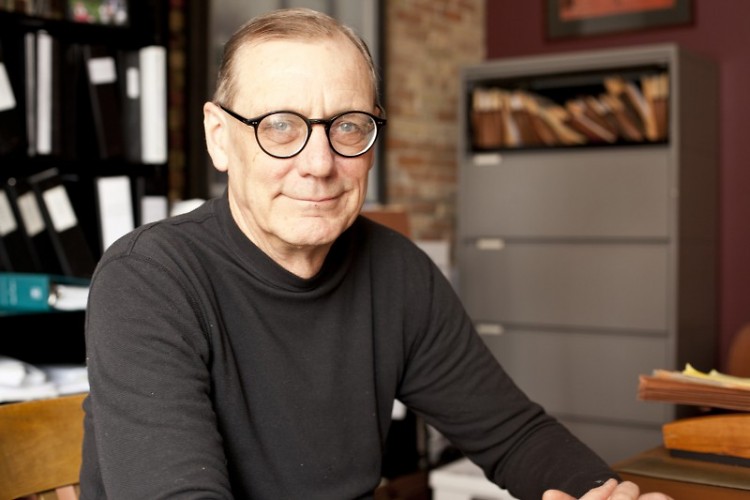Attorney Jack Hoffman may be most widely known for his public role in the ballot efforts with Decriminalize Grand Rapids (DCGR), including his public letter to the City Attorney that he published as a citizen journalist on The Rapidian.
“The only way I could communicate with the people who were making the decisions was to go public- so I did,” he says of his decision to publish his letter here. “And I appreciated the ability to do that.”
Hoffman says he encourages “all good urbanists” to utilize The Rapidian as a platform for the changes they want to make in the city.
“ The online community is very consistent with the whole urbanism/urban community ethos or structure. Ever since cities were invented about 10,000 years ago, one of the attractions and most powerful things about cities has been that you get people close together and it creates these interactions and creative developments start to occur just by nature of people starting to talk to each other and networking. Online media just reinforces that,” he says. “The Rapidian and other organs like it are great assets to the project of city-building.”
But Hoffman says that fight with DCGR was just one in a long line of many aimed at building a better city, and was a fight that fit right in line with others aimed at preserving historic buildings, improving public transportation and improving city parks.
“Although it seems at the outset that decriminalization of marijuana is different from my historic preservation [efforts], I always felt that it was part of a consistent package. Which is why I took it on when they asked me to be their legal counsel,” he says. “I don’t usually take legal work that is contrary to the values that I want to see developed. And I’ve been fortunate to be able to have a good practice doing the things that I like to do and feel are valuable.”
Hoffman says this was not his first foray into activism, but rather the way he’s always aimed to practice law.
“When I was in law school, and a young lawyer, at that time being an activist lawyer was kind of an ideal or a value. That was an ideal for me too- not only to use your legal skills to earn a living but to be involved in the community- to make things better,” he says. “At the same time, the urbanist movement was starting to take off. Cities were really hard-hit from the mid-50s up until the late 80s. There was so much disinvestment in the cities. The only people that stayed in the cities were those that couldn’t afford to leave.”
So Hoffman got heavily involved in historic preservation law.
“But then we started to realize that it wasn’t just individual buildings. The way cities were designed before World War II was much more livable, much more humane,” says Hoffman. “Cities are good places to live- not the places that had been demonized for so many decades after the war. [That’ when] all the things came together: my desire to be an activist and be involved, my appreciation for history and historic architecture and structures, and urbanism and city-building.”
Hoffman and the firm he works with, Kuiper Orlebeke, have worked extensively over the years with many affordable housing developers, like Inner City Christian Federation (ICCF) and Dwelling Place.
“That was very consistent with my goals because the truth is that Denny Sturtevant at Dwelling Place was preserving historic buildings. He was an ally of the historic preservationists long before other for-profit developers saw the value of it,” he says. “We’ve done the tax credit financing for dozens of downtown buildings that probably would have otherwise been destroyed or vacant and fallen victim to fires.”
Because of his work in the city over the years, his morning walk to work is filled with reminders of the things he has been able to accomplish.
“It’s a cliche that the only way to appreciate a city’s architecture is to walk through it because it’s human scale. I’m fortunate because I can see the buildings or the parks or the projects that we worked on. You see them and they’re working and people are using them and you remember all the fights we’ve had and the good people we’ve worked with. It’s very satisfying. It’s something money can’t buy,” he says. “It’s interesting to participate in the process to try to bring the law more into line with the way I think things should be. That’s gratifying. And it’s nice to get paid for it as well. Earn while you’re having fun, right?”
Being involved in the urban community can be a highly rewarding way of life, he says.
“I wholeheartedly encourage people to come to the city. Participate in the city, and you’ll be happy you did,” he says. “And you’ll contribute to the common good, the well-being of the whole. The more people that participate, the better off we all are."
The Rapidian, a program of the 501(c)3 nonprofit Community Media Center, relies on the community’s support to help cover the cost of training reporters and publishing content.
We need your help.
If each of our readers and content creators who values this community platform help support its creation and maintenance, The Rapidian can continue to educate and facilitate a conversation around issues for years to come.
Please support The Rapidian and make a contribution today.

